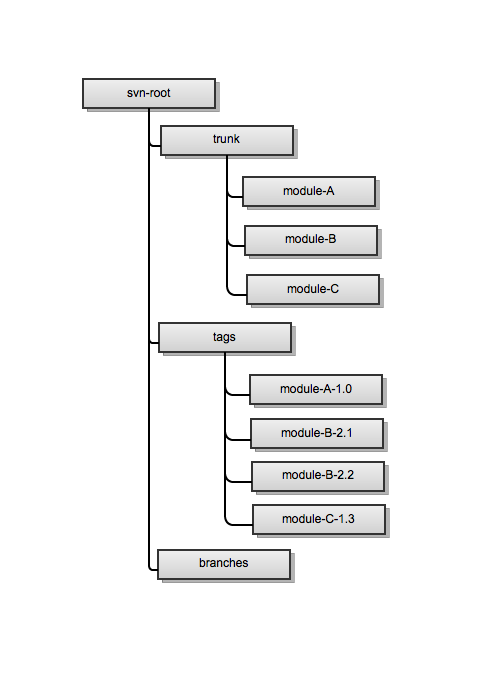We are moving both our public and private source repositories to Git for a few reasons:
- Git works better for people with slow or lagging connections
- Branch management is easy
- Submitting patches via a pull request is easier to deal with than a patch attached to a bug report
We started out with SVN mostly because that was what everyone was used to. A year ago or so, one of our remote developers started using a git-svn mirror to remove some of the latency issues they had with SVN. Someone else put together a ten page wiki on how to easily use a git-svn mirror and push back to the canonical SVN repo. As time went on, interest in git grew and new modules were created in git, instead of our SVN repositories. Finally there was a push to move everything to git.
There were a couple different directory conventions used for our repositories. Our Nexus SVN repository used the typical project-root/trunk,tags,branches, and git-svn worked nice right out of the box. Our other repositories lumped all modules under the trunk, tags, and branches folder (figure 1).
We decided to give each module its own git repository to better manage tags and branches related to the given module. This made the git import a pain, as you cannot just export tags/* (and tags/module-B-* will not work either), you need to be more selective and configure each tag to pull.
In a nut shell you need to:
(1) Create a new git repository.
$ git svn init --trunk=trunk/project <svn-root> <repo-name>
(2) Configure the specific tags you want to export (we use the Maven release plugin, so the tagging convention is the same)
$ git config --add svn-remote.svn.tags tags/{module-B-2.1, module-B-2.2}:refs/remotes/tags/*
(3) Fetch everything (for an automated way of generating an authors file see this blog post)
$ git svn fetch --authors-file=<svn-authors-file>
(4) Next you need to clean up the tags and push.
If you script this, you end up with something like:
#!/bin/bash
CURRENT_PATH=`pwd`
# file based URL for reads
SVN_URL=file:///path/to/repositories/sonatype.org/spice
SVN_REMOTE_URL=https://svn.sonatype.org/spice
SVN_TAGS_DIR=tags
SVN_TAG_PREFIX=$1
SVN_TRUNK_DIR=trunk/${SVN_TAG_PREFIX}
SVN_AUTHORS=/path/to/svn-authors.txt
GIT_REPO_NAME=$1
GITHUB_USER=userid
GITHUB_TOKEN=xxx
GITHUB_TEAM_ID=1234
GITHUB_ORG=sonatype
# this is the magic, get the list of tags that match this project the output format looks like:
# tags/{module-1.0,module-1.2,module-2.1}
GIT_TAG_ARG=${SVN_TAGS_DIR}/\{`svn list ${SVN_URL}/${SVN_TAGS_DIR} | grep ${SVN_TAG_PREFIX} | sed 's_/__' | xargs -I {} echo -n ,{} | sed 's_^,__'`\}
#echo ${GIT_TAG_ARG}
# init git repo
git svn init --trunk=${SVN_TRUNK_DIR} ${SVN_URL} ${SVN_TAG_PREFIX}
#copy authors text to repo
cp ${SVN_AUTHORS} ${SVN_TAG_PREFIX}/.svn-authors.txt
# move to directory
cd ${SVN_TAG_PREFIX}
# make sure we have tags for this project
if [ `svn list ${SVN_URL}/${SVN_TAGS_DIR} | grep ${SVN_TAG_PREFIX} | wc -l` -gt 0 ]; then
#configure the tags, we only want a subset of the tags, because we lumpped all the tags in a single place.
git config --add svn-remote.svn.tags ${GIT_TAG_ARG}:refs/remotes/tags/*
fi
#fetch
git svn fetch --authors-file=.svn-authors.txt
# make sure there are no errors before we continue
if [ "$?" -ne "0" ]; then
echo "Error while fetching, see above"
exit 1
fi
git update-ref -d master
##########################################################
# fix the tags, from: https://github.com/nothingmuch/git-svn-abandon
##########################################################
# create annotated tags out of svn tags
git for-each-ref --format='%(refname)' refs/remotes/tags/* | while read tag_ref; do
tag=${tag_ref#refs/remotes/tags/}
tree=$( git rev-parse "$tag_ref": )
# find the oldest ancestor for which the tree is the same
parent_ref="$tag_ref";
while [ $( git rev-parse --quiet --verify "$parent_ref"^: ) = "$tree" ]; do
parent_ref="$parent_ref"^
done
parent=$( git rev-parse "$parent_ref" );
# if this ancestor is in trunk then we can just tag it
# otherwise the tag has diverged from trunk and it's actually more like a
# branch than a tag
merge=$( git merge-base "refs/remotes/trunk" $parent );
if [ "$merge" = "$parent" ]; then
target_ref=$parent
else
echo "tag has diverged: $tag"
target_ref="$tag_ref"
fi
# create an annotated tag based on the last commit in the tag, and delete the "branchy" ref for the tag
git show -s --pretty='format:%s%n%n%b' "$tag_ref" | \
perl -ne 'next if /^git-svn-id:/; $s++, next if /^\s*r\d+\@.*:.*\|/; s/^ // if $s; print' | \
env GIT_COMMITTER_NAME="$( git show -s --pretty='format:%an' "$tag_ref" )" \
GIT_COMMITTER_EMAIL="$( git show -s --pretty='format:%ae' "$tag_ref" )" \
GIT_COMMITTER_DATE="$( git show -s --pretty='format:%ad' "$tag_ref" )" \
git tag -a -F - "$tag" "$target_ref"
git update-ref -d "$tag_ref"
done
# create local branches out of svn branches
git for-each-ref --format='%(refname)' refs/remotes/ | while read branch_ref; do
branch=${branch_ref#refs/remotes/}
git branch "$branch" "$branch_ref"
git update-ref -d "$branch_ref"
done
# remove merged branches
git for-each-ref --format='%(refname)' refs/heads | while read branch; do
git rev-parse --quiet --verify "$branch" || continue # make sure it still exists
git symbolic-ref HEAD "$branch"
git branch -d $( git branch --merged | grep -v '^\*' )
done
##########################################################
# done fixing tags
##########################################################
# we should already be on the master, but lets make sure
git checkout master
##
# Use the Github API to create a repo and add it to the team.
##
#create github repo
curl -F "login=${GITHUB_USER}" -F "token=${GITHUB_TOKEN}" https://github.com/api/v2/json/repos/create -F "name=${GITHUB_ORG}/${GIT_REPO_NAME}" -F "has_issues=false" -F "has_downloads=false" -F "has_wiki=false" --request POST
#add the dev team to the repo
curl -F "login=${GITHUB_USER}" -F "token=${GITHUB_TOKEN}" -F "name=${GITHUB_ORG}/${GIT_REPO_NAME}" http://github.com/api/v2/json/teams/${GITHUB_TEAM_ID}/repositories
# set the origin
git remote add origin git@github.com:${GITHUB_ORG}/${GIT_REPO_NAME}.git
#push it all
git push --tags origin master
#go back to where we started
cd ${CURRENT_PATH}
# some reminders so we do not forget the manual steps
echo "--${GIT_REPO_NAME}--" >> migrate.out
echo "You should now review the git repo at: https://github.com/${GITHUB_ORG}/${GIT_REPO_NAME} then remove the svn repo with:" >> migrate.out
echo "$ svn rm ${SVN_REMOTE_URL}/${SVN_TRUNK_DIR} -m \"Moved to github: https://github.com/${GITHUB_ORG}/${GIT_REPO_NAME}\"" >> migrate.out
echo "Do not forget to update the grid: https://grid.sonatype.org/ci/\" to use: git://github.com/${GITHUB_ORG}/${GIT_REPO_NAME}.git >> migrate.out
echo "Add redirect from ${SVN_REMOTE_URL}/${SVN_TRUNK_DIR} to https://github.com/${GITHUB_ORG}/${GIT_REPO_NAME}" >> migrate.out
echo "" >> migrate.out

Written by Brian Demers
Brian is a Developer Advocate at Okta. He has a strong knowledge of Java including experience with an array of java and web-base technologies, along with involvement in open source communities.




